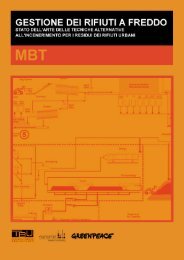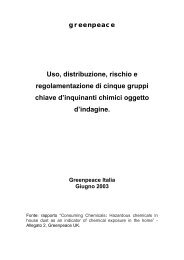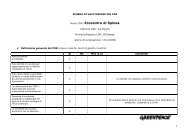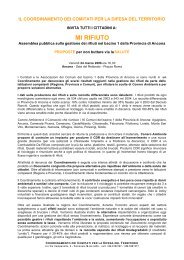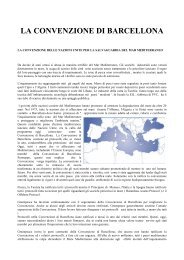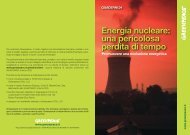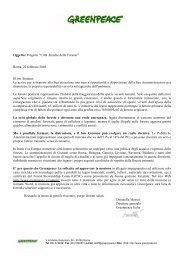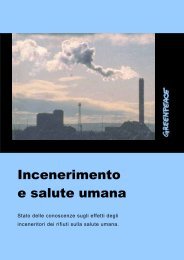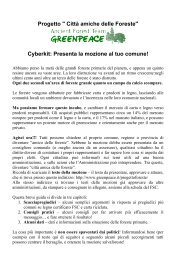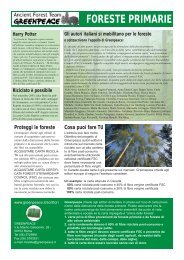Zero Waste by Robin Murray, Greenpeace Environmental Trust 2002
Zero Waste by Robin Murray, Greenpeace Environmental Trust 2002
Zero Waste by Robin Murray, Greenpeace Environmental Trust 2002
You also want an ePaper? Increase the reach of your titles
YUMPU automatically turns print PDFs into web optimized ePapers that Google loves.
housing estates, for example, have unused collective<br />
areas – empty shops or garages that can be used as<br />
mini recycling depots. Parks have space and machinery<br />
suitable for composting. Highways have specialist<br />
vehicles and depots that could be rented for recycling;<br />
• the operating patterns, schedules, capacity utilisation,<br />
breakdowns, distance to disposal and maintenance<br />
arrangements;<br />
• the costs and income not just of the waste<br />
departments, but of all sections of the authority<br />
producing waste (one study in a London borough<br />
found that the per tonne cost of waste management on<br />
estates was nearly ten times that for ordinary domestic<br />
refuse rounds). Authority-wide costing will be the base<br />
marker or bottom line against which the costs of any<br />
new waste system have to be judged.<br />
6. Social marketing<br />
Earlier I discussed the central place of environmental<br />
values in the design and operation of successful recycling<br />
schemes. However, no service of this kind can succeed on<br />
ethics alone. The experience of both environmental and<br />
ethical trading is that the qualities normally expected of a<br />
service or commodity are the primary issue. Ethical<br />
market research shows that there are a small minority<br />
(often no more than 1%) who will buy recycled paper or<br />
fairly traded coffee whatever the quality. A further 30%<br />
are actively sympathetic to the ideas in question, and may<br />
even be willing to pay a little more (say an extra 10%) if<br />
the item in question is equivalent to conventional goods in<br />
quality. Another 40% will buy if both price and quality<br />
match the competition. A residual cohort remain<br />
indifferent or are even hostile. These proportions can<br />
change over time but the principle of an ethical ‘bell<br />
curve’ still holds.<br />
Recycling has learnt similar lessons. For most people, the<br />
environmental value of the service is not enough if the<br />
service is irregular or inconvenient. To achieve high levels<br />
of participation recyclers have had to ensure that, in<br />
addition to the focus on ‘meaning’, they also offer a high<br />
quality service and employ the skills and social marketing<br />
techniques required. If recycling is in competition with the<br />
dustbin, then it has to be organised in a way that<br />
maximises its advantages and minimises its drawbacks.<br />
Among the points of importance are the following:<br />
• simplicity. The highest participation rates come from a<br />
weekly service, preferably on the same day as a<br />
residual collection;<br />
• convenience. Recycling boxes and organic containers<br />
need to be designed to take account first and foremost<br />
of householder convenience, with vertical boxes for<br />
flats for example, or small ‘compostainers’ for<br />
collecting organics in the sink;<br />
• design. Good services require good design – of<br />
equipment, containers, workwear, and leaflets;<br />
• advice. If householders are producers, then some<br />
aspects of recycling require advice. In the case of<br />
composting, the best schemes have employed compost<br />
doctors to help establish a compost bin, and to<br />
troubleshoot for those with problems; for recycling the<br />
collector can usually advise on materials that should<br />
be left out or included;<br />
• tracking. Bar codes on recycling boxes have allowed<br />
collectors to monitor participation rates, with thanks<br />
to those who participate regularly, and direct<br />
approaches to those who don’t;<br />
• feedback. Regular feedback on the quantities of<br />
material collected and its use has been found to<br />
increase participation rates. This can be done through<br />
a newsletter left in the recycling box (boxes are now<br />
available with message slots so that they become a<br />
weekly vehicle for communication);<br />
56<br />
<strong>Zero</strong> <strong>Waste</strong><br />
57



